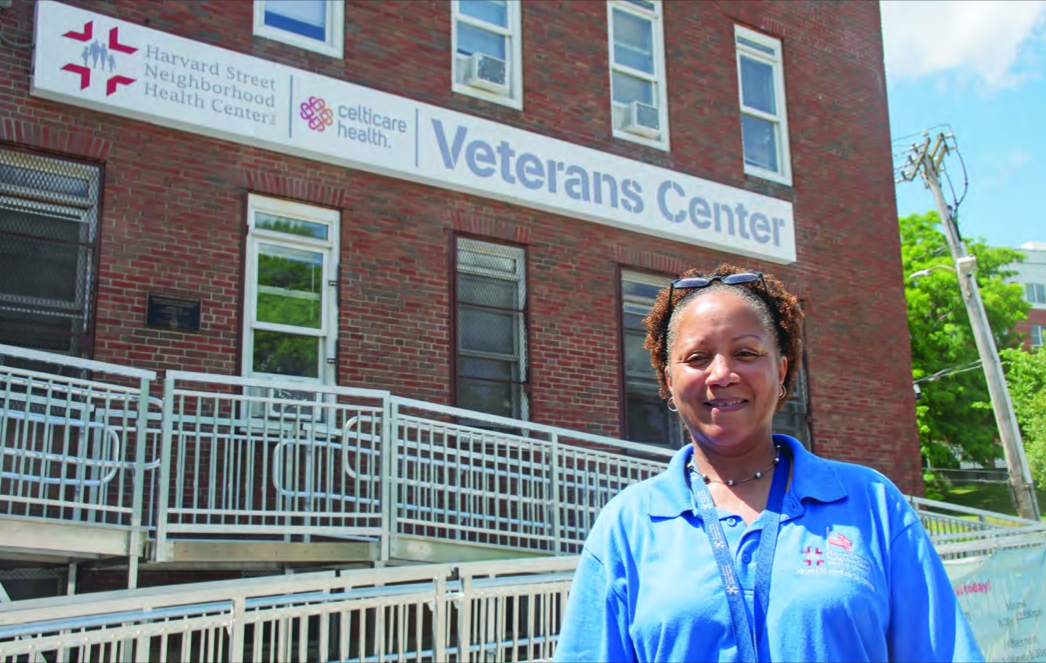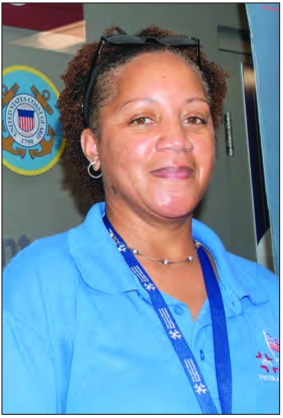
Kathryn King, program director of the Veterans Outreach Center at the Harvard Street Neighborhood Health Center, poses for a picture at the center’s offices in Dorchester, June 27. The center, which King took over leadership of in February, offers hot meals, computer classes and other programing and is aiming to become a one-stop-shop for local veterans and the services they need.
Kathryn King
For eight years, Kathryn King served in the U.S. Army Reserves. Now, based out of a stout brick building on Blue Hill Avenue, she has a new mission, focused on supporting and affirming the dignity of veterans in the Boston area.
There, King serves as program director of the Veterans Outreach Center at Harvard Street Neighborhood Health Center, a role she took up in February, where she is attempting to revitalize the program to expand offerings and better support local veterans.
“We just want to make sure that there’s an abundance of resources, whether we can provide them directly or refer them out to another agency,” King said.
The program — currently operated by King and Assiatu Bah, the center’s outreach
coordinator — runs classes, gives out supplies, offers connections to
medical services, and serves hot meals and shelf-stable staples to the
veterans who attend — though some of those offerings are on hold pending
ongoing construction at the center.
Through all the work runs a single thread that King summed up with the word “dignity.”
“We
know their faces. We know their names,” she said. “They’re not just
somebody that’s in our database. It’s a human connection.”
Charles
Murphy, president and CEO of Harvard Street Neighborhood Health Center,
said with King in charge, the programming is gaining more traction.
“Under
her leadership, it really has started to take root, and it’s just a
very open and welcoming place, where we’ve got any number of vets coming
down every day just to shoot the breeze, have coffee, whatever the case
may be, or attend the computer classes or the other programming that
we’re offering,” he said.
Now, the veterans center is in a moment of transition as King leads works to revamp and revitalize it.
Some of those efforts are small.
Since
joining, she has changed the lunch and breakfast menu and opted not to
restock the “oodles” of instant ramen noodles she inherited as director,
to make food offerings healthier.
Partnerships
with groups like the Disabled American Veterans (DAV) help clients
maneuver a complex system and get access to veterans
benefits they may not have known they could get. Through a collaboration
with Home Base, a veterans organization founded by the Red Sox and
Massachusetts General Hospital, the outreach center connects clients
with comprehensive mental health evaluation services.
Other
changes the center is pursuing are heftier. A nearly $60,000 grant from
the state’s Executive Office of Veterans Services is funding ongoing
construction in the center’s offices to convert two storage rooms into
multipurpose spaces that King said will allow the center to offer
programs like art therapy or more tailored individual therapy for
clients.
The center is
also looking to expand to support veterans who are homeless or at risk
of becoming homeless. A grant it applied for from the executive office
could bring in more than $1 million to hire a housing manager and a
housing specialist. King called that effort “a critical concern” for the
center.
“We
do have homeless vets that come here that are either staying at [the
New England Center and Home for Veterans] or Pine Street Inn,” King
said. “They could be staying with family, or they’re just in a displaced
situation, and it would mean a lot to us to be able
to assist them with finding someplace to live, or sustaining where they’re living, not just to be a Band-Aid approach to it.”
The
center is also eyeing bigger steps toward supporting homeless veterans
by building and managing veteran housing in connection with the Harvard
Street Neighborhood Health Center, but Murphy said that work is in the
early stages, and they have yet to take substantive steps toward those
goals.
Overall, he
said, he hopes the changes the center is pursuing could bring more
awareness about the program and introduce more veterans to the services
offered.
“It’s just
more opportunity,” Murphy said. “The busier we get, the more prominent
we become. It’s just more folks who are coming in, getting services that
they otherwise wouldn’t get.”
And
that work seems to be paying off. In May, the center saw 94 veterans in
and using its services. King said that number has gradually been rising
since early this year — though the construction, which forced the
center to switch from drop-in services to services by appointment, meant
the numbers fell in June.
The
new work joins other existing programming, like a Boots 2 Technology
course offered through a contract with Roxbury-based Timothy Smith
Network. The six-week course offers veterans a chance to learn computer
skills and provides them with a free laptop at the completion of the
course in an attempt to close digital divides.
A
computer lab offers space for clients to access the internet and apply
for jobs or make Zoom calls. A storage closet packed full of suits and
ties and blouses is the Tailored for Success Mini Boutique, where
veterans can take home professional clothing for free. Another room
holds a stash of spare toiletries in buckets and boxes for clients in
need of them. When the center isn’t under construction, a
little kitchen serves hot breakfasts and lunches for veterans twice a
week, on Tuesdays and Wednesdays.
As
part of the Harvard Street Neighborhood Health Center, the outreach
center can also refer its veterans to other physical and mental health
services — something King said can be key for clients who are not part
of the Veteran Administration’s health care system.
The
same building that houses the veterans center also is the home of the
health center’s behavioral health services, and about half a mile down
Blue Hill Avenue, at its main facility, veterans served by the outreach
center can access the health center’s family medicine and adult clinics.
“If
they need a primary care doctor, we have that,” King said. “If they
need dental or vision, on our intake sheet those are areas that they can
check off.”
But, at
its core, the outreach center is focused on providing veterans a place
to get together with people with a shared experience.
“It’s
actually been a lifeline for some folks dealing with depression,
anxiety, PTSD, unfortunately some suicidal ideations,” King said. “Being
in a community that understands them is very critical.”
Murphy
said that the goal of creating a common space for veterans to get
together has been at the crux of the center’s work since its founding in
2016.
“That was sort
of the primary driver in the day,” he said. “Just a spot for the
Dorchester, Mattapan, Roxbury area for vets who otherwise wouldn’t have a
place to go. It seems to be working out.”